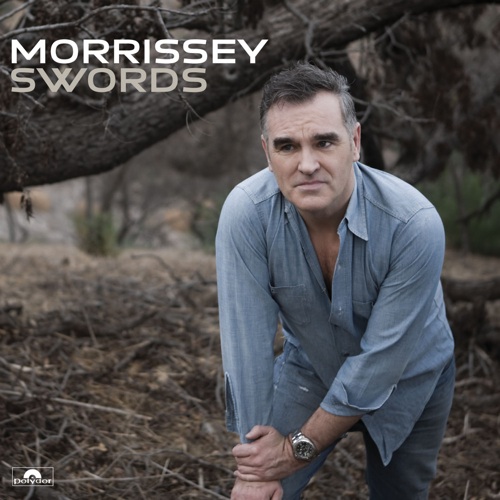The title of Morrissey’s latest collection is a bit combative – why Swords? Sure, Morrissey has always been a bit of an arch, cranky git but there’s nothing here that necessarily exudes copious amounts of hatred, venom, or violence. The bizarre album cover doesn’t really help things either; he doesn’t look ready to fight, but rather like an old man lost in the forest. Still, though, the songs speak for themselves, and they are unequivocally witty and biting (perhaps the album should have been called “Teeth”), often effortlessly so. And yes, this is a b-sides collection, but Morrissey is an English artist extraordinaire, one of the old-fashioned types who believe in the art form of the single, replete with multiple b-sides and (more recently) multiple “parts” – which means even more b-sides! This collection, focusing only on Moz’s post-hiatus career, collects 18 of these b-sides – not all of them, but a good amount – in a surprisingly coherent fashion.
Either there were just too many good tracks to choose from, or because it is a collection rather than a proper album, any preconceptions about length or breadth seem to have been thrown out the window. And while Swords doesn’t totally fill out the disc it inhabits (thankfully), it’s still eighteen tracks and sixty-seven minutes long, whereas the typical Moz album will take about 45 minutes of your time. It’s worth it though, and Swords is sequenced wonderfully – it stays interesting, captivating, and never feels like you’re listening to an eighteen-track album. You’d probably never guess these tracks were b-sides – there are no alternate takes, throwaways, sketches or jokes here, just top-notch Moz of the sort you’d hear on any of his recent albums. Because they stick to his last three albums, the album also has a uniform feel and style, the sort of overdramatic wailing backed by FM-rock swagger that has been his trademark as of late.
It would be a lie to say that all the tracks are amongst the best of his storied career, but some of them are glorious, even breathtaking. One of the prettiest recent Moz songs, “Never Played-Symphonies” (the b-side to “Irish Blood, English Heart”) is a Beatles-esque ballad with a whimsical, lilting melody, the complete opposite of its blunt and brash A-side. It’s a majestic, confident song, and the idea that heretofore it was relegated to b-side status is appalling. Other especially strong tracks include the vitriolic “Children in Pieces,” feeling like a more direct, to-the-point version of “The Headmaster Ritual,” the hilarious “Don’t Make Fun of Daddy’s Voice,” and the simultaneously sardonic and dismissive (and lengthy) didactics of “Ganglord” and “Christian Dior,” the former feeling somewhat bloated and overblown and the latter being flat-out hilarious:
“Christian Dior
You wasted your life
Sensually stroking the weaves of a sleeve
You could have run wild
On the backstreets of Lyon or Marseille
Reckless and legless and stoned
Impregnating women
Or kissing mad street boys from Napoli
Who couldn’t even spell their own name “
The recent b-sides especially are strong; the two from latest album Years of Refusal are some of the best on the album. “Because of My Poor Education” is a swooning, piano-driven song with an engaging vocal and “Shame is the Name” is an angry, sadistic track featuring Chrissie Hynde on unobtrusive backing vocals. Typical insecure Moz is also in fine display here on the classic-sounding tracks “If You Don’t Like Me, Don’t Look At Me,” “It’s Hard To Walk Tall When You’re Small,” and “My Life is a Succession of People Saying Goodbye.” He even displays a shocking bit of thoughtfulness, empathy and even caring on the somewhat overbearingly preachy “Teenage Dad on His Estate,” telling the subject of the song not to look down on the teenage dad, “he’s so happy/so leave him alone.”
Swords isn’t perfect – it is a b-sides collection overall. But despite its unwieldy length, it’s extraordinarily sequenced, tightly performed and impeccably sung (of course). In fact, were it not for the unfortunate inclusion of a live cover of the Bowie classic “Drive-In Saturday,” it could easily fool an ignorant listener into thinking it was a real studio album. The fact that there are so many great tracks here – leftovers from a five-year period including three entire albums – is indicative of a rejuvenated, incredibly prolific Morrissey, perhaps even peaking so late in his career. It may be blasphemy to even compare his solo career to his work in the Smiths, but he’s had an incredible output in such a short time, arguably reminiscent of that legendary band. And three great albums in a row, without a stinker in sight, with a solid collection of b-sides behind it, simply has no analogue elsewhere in the Morrissey solo catalogue. Rarely does an artist have such a quality yield almost thirty years into their career, and even more rarely is it so abundant. Morrissey is consistently outdoing himself as he enters his fifties, and we should appreciate him while we can.

